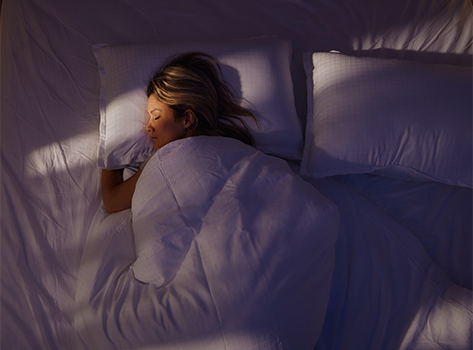Obstructive sleep apnea (OSA) can disrupt your life with difficult symptoms like snoring, poor sleep, drowsiness, irritability, morning headaches and memory impairment. But, sleep apnea can affect your health in other ways including hypertension, obesity, diabetes, risk of stroke and cardiovascular issues. Treating sleep apnea is a critical part of a physically and mentally healthier and happier life.
CPAP, or continuous positive airway pressure, is often the first line of treatment for sleep apnea and can be very effective for many patients. However, for some patients, an alternative therapy called hypoglossal nerve stimulation may offer better results.
An Alternative Approach to Sleep Apnea Treatment
Fortunately, qualified patients have an alternative approach to treating their sleep apnea with an upper airway stimulation device called a hypoglossal nerve stimulator, or HGNS. Atlantic Health System team members, who are part of a multidisciplinary, collaborative group focused on sleep apnea treatment, have special certification to perform this procedure.
Gloria L. was one of those patients. She initially used a CPAP machine for her OSA and had tried several types of masks, but none worked well for her. Plus, with frequent travel, taking her CPAP machine with her on trips was a packing challenge. Gloria contacted Atlantic Health’s Sleep Wellness Program to explore a different option for her therapy.
“The treatment has been incredible,” says Gloria. “It allows me to sleep soundly, and I feel energized the next day.”
How HGNS Works for Patients with Sleep Apnea
Patients interested in HGNS undergo a comprehensive sleep medicine consultation, which may include sleep study testing, to determine their degree of OSA. They also have a surgical evaluation to determine eligibility for the implant procedure.
During the procedure, a surgeon implants a small device in the upper part of the right-side chest. This device delivers gentle pulses to the nerve that moves the tongue forward. These pulses help keep the airway open so patients can breathe regularly and sleep soundly without obstruction.
“It is a game changer and people are having excellent results,” said Tom Thomas, MD, director of Sleep Surgery, Head and Neck Reconstructive Surgery and Transoral Robotic Surgery at the Leonard B. Kahn Head and Neck Cancer Institute, Morristown Medical Center.
After the procedure, patients return to the sleep medicine specialist for their device’s activation, adjustments and ongoing monitoring.
“Our patients have had very good results so far,” says Federico Cerrone, MD, Medical Director of Atlantic Health Sleep Centers and System Associate Medical Director of Pulmonology, Sleep and Allergy services. “HGN stimulation is another choice we can give to patients.”
Gloria encourages others considering the treatment to check if they are candidates.
“This treatment has changed my life and I recommend it for anyone who is eligible,” she said. “The entire medical and surgical team were phenomenal, and care was exceptional,” says Gloria. “I am grateful for both the doctors and the team at Atlantic Health System that made this possible for me.”












